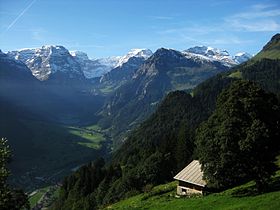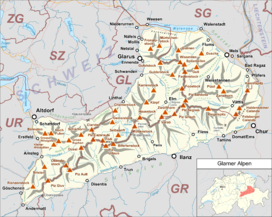Glarus Alps
| Glarus Alps | |
|---|---|
| Glarner Alpen | |

Glarus Alps from Braunwald
|
|
| Highest point | |
| Peak | Tödi |
| Elevation | 3,614 m (11,857 ft) |
| Coordinates | 46°48′40″N 8°54′53″E / 46.81111°N 8.91472°E |
| Geography | |
| Country | Switzerland |
| Cantons | Glarus, Uri, Graubünden and St Gallen |
| Range coordinates | 46°56′N 8°55′E / 46.93°N 8.92°ECoordinates: 46°56′N 8°55′E / 46.93°N 8.92°E |
| Parent range | Western Alps |
| Borders on | |
| Topo map | Swiss Federal Office of Topography swisstopo |
| Geology | |
| Orogeny | Alpine orogeny |
The Glarus Alps (German: Glarner Alpen) are a mountain range in central Switzerland. They are bordered by the Uri Alps and the Schwyz Alps to the west, the Lepontine Alps to the south, the Appenzell Alps to the northeast. The eastern part of the Glarus Alps contains a major thrust fault which was declared a geologic UNESCO world heritage site (the Swiss Tectonic Arena Sardona).
The Glarus Alps extend well beyond the canton of Glarus, including parts of the cantons of Uri, Graubünden, and St Gallen. Conversely, not all the mountains in the canton of Glarus are part of the Glarus Alps, with those to the north of the Urner Boden and to the west of the valley of the river Linth considered to be part of the Schwyz Alps.
The main chain of the Glarus Alps can be divided into six minor groups, separated from each other by passes, the lowest of which exceeds 7,500 ft. The westernmost of these is the Crispalt, a rugged range including many peaks of nearly equal height. The highest of these are the Piz Giuv (3,096 m) and Piz Nair. The name Crispalt is given to a southern, but secondary, peak of Piz Giuv, measuring 3,070 m. West of the main group is the Rienzenstock, while a northern outlyer culminates in the Bristen. East of the Crispalt, the Kreuzli or Chrüxli Pass separates this from the rather higher mass of the (3,328 m).
...
Wikipedia

